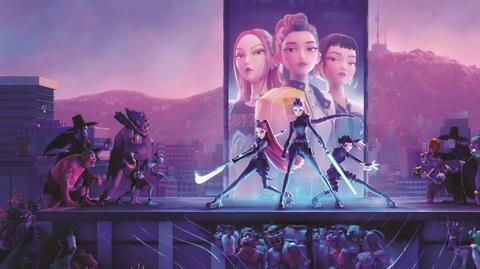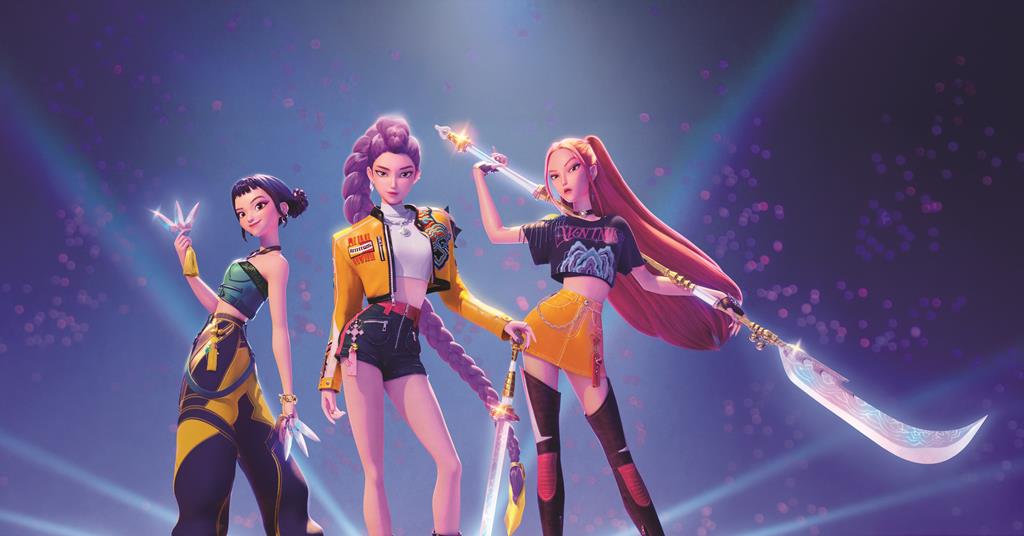Premier Christianity uses cookies Read our cookie policy.
By 2025-11-27T15:41:00+00:00
The biggest movie in Netflix history was released this summer, but you’ve probably never considered watching it. Martin Saunders explains what you need to know about KPop Demon Hunters – and considers how Christians should respond to the phenomenon that is anime
For generations, demons have preyed on human souls. Thankfully, three legendary warriors have stood in their way – using ancient magic to create a protective barrier between humanity and the demonic realm. Sounds familiar, doesn’t it? A little bit like something CS Lewis might have written as an allegory for the great spiritual battle that Christians believe rages beyond what is visible.
But in this case, it’s actually the set-up for KPop Demon Hunters, the come-from-nowhere smash hit animation that has already become Netflix’s most watched film of all time.
In fact, that’s something of an understatement. The film went on general release in June; by August it had already surpassed the viewing figures for every other film in the streaming service’s history. At time of writing, it’s been watched more than 325 million times. Yet it’s possible that this is the first you’ve ever heard of it.
So, what has made KPop Demon Hunters such a gargantuan success? And should we be excited about its spiritual themes, or concerned about demonic glorification? As always, the answer isn’t entirely straightforward.
At first glance, one could argue that Demon Hunters is just the latest film to break out of the anime stable into wider popular culture. But that’s slightly misleading; the movie is actually an American-made contribution to a Japanese-dominated cultural genre. The term ‘anime’ is generally used to describe Japanese animated films and TV series which often carry a very distinctive visual style, but that style is now evoked by creators way beyond Japan.
In an age when so many are cynical about faith, audiences still want to believe that light can overcome darkness
Even if you’ve no interest in anime, or Japanese culture as a whole, you’ve likely seen the distinctive traits of the medium: characters with large, expressive eyes, complex plots and beautifully rendered backgrounds. Its influence is felt in cultural offerings as diverse as Pokémon cards, a drama called Fanfare of Adolescence (about teenage jockeys) and the cinematic masterpieces of Studio Ghibli. Anime is a bona fide cultural phenomenon with a worldwide fan base – including here in the UK.
And the medium is certainly not just for children. Although many fantastic kids’ productions exist, such as the Oscar-winning Spirited Away, some of the most popular films and TV shows are aimed at a broader audience. KPop Demon Hunters has enjoyed widespread success because it entertains adults and children alike. There’s also plenty of anime which is in no way suitable for a younger audience, and concerns persist that a production like this might provide a gateway to the more hardcore end of the spectrum. Many anime productions explore dark, even bleak themes or feature violence and gore, while there is an entire sub-genre devoted to anime-style pornography.
Despite its popularity, then, there’s plenty to be concerned about. One CofE primary school in Poole recently made national headlines when it banned pupils from singing the film’s musical numbers over concerns they could make Christians feel “deeply uncomfortable”.
The medium as a whole appears to wear its embrace of spirituality on its sleeve. Angels and demons are frequently characterised, and religious symbols – including the crucifix – often feature. The question is, why?
Anime is really a medium rather than a genre, but there are some recurring themes that pervade many of its productions. Some chime with a Christian perspective: redemption, sacrifice, friendship and forgiveness. Other anime films and shows offer a more nihilistic worldview, taking a dim view of the human race and its future. KPop Demon Hunters, which tells the story of three pop stars who face up to ideas of sin and shame – and essentially defeat the evil demons through a kind of repentance from sin – sits in the first of these categories.
It’s hard to either affirm or condemn anime. Sometimes the medium believes in hope and redemption; often it does not. There are clearly some elements to avoid, such as those that are hyper violent or sexualised – but this is just as present in Western TV and cinema. And it’s hard to recommend stories that portray a bleak, hopeless vision of humanity’s futile fight against unvanquishable darkness. So what do we do with the current Netflix megalith that appears to offer a bridge into Christian themes? Put simply, I think we should engage with it, but with our eyes open.
Demon Hunters is a great example of anime that is at least Christian-adjacent. There are a range of themes and plot points which evoke or chime with Christian ideas (see box). Yet it’s really important to make a distinction here: as far as we know, none of the filmmakers involved are coming from a Christian perspective.
That doesn’t mean it’s not useful in evangelism and discipleship, especially if we’re working with young people who love the movie. It’s important to note that many children and teens don’t simply love the film but are borderline obsessed with it. For them at least, Demon Hunters creates an easy bridge to conversation on a whole range of topics.
The creators didn’t set out to lead people towards Jesus, but they’re raising questions to which he is the only good answer
In that famous encounter in Athens in Acts 17, Paul points to the altar built “to an unknown god” and explains that the people are “ignorant of the very thing [they] worship” (v23), drawing engagement from the fascinated philosophers who’ve gathered to debate the latest ideas.
Very often, elements of our culture point directly to God, even when their human creators were not conscious of it. It’s the Holy Spirit showing up in the ‘Force’ of Star Wars; the death and resurrection scenes in Harry Potter, the Avengers movies – and more. These things were not put there to point to Jesus, but that doesn’t prevent us from using them to do just that. We might wonder if God is even inspiring these iconic cultural moments himself, in an effort to draw the attention of the world that he so loves.
KPop Demon Hunters is arguably exactly that sort of cultural offering. It can create conversation about many of the things that Christians would love to talk with their friends about. Sin and forgiveness? Check. Spiritual warfare and light overcoming darkness? All present. The creators of this film didn’t set out to lead people towards Jesus, but they’re raising questions to which he is the only good answer.
Using the rule of thumb that when a terrible Ice Age movie makes $500m, the one thing you can be certain of is another Ice Age movie, we can safely predict that anime will be an increasing presence in our cultural landscape. A sequel to KPop Demon Hunters is already in production but, in the meantime, stand by for an avalanche of soundalike musicals and a much broader range of mainstream anime.
Some of them could create a similar bridge into the Christian story, but it’s also likely that this is not their makers’ intention. So, it’s important to remember that the spiritual underpinnings, such as they exist, are not anchored in Christ. Anime films like to depict angels, can centre the symbol of the cross, and even make use of Judeo-Christian language for exotic effect (there’s one entitled Neon Genesis Evangelion, which sounds like it just must be Christian). Yet we project Western and Christian interpretations upon symbolism created in a culture where Buddhism and Shintoism are far more dominant religious forces at our peril. We shouldn’t mistake symbolism for substance.
We shouldn’t mistake symbolism for substance
With all those caveats in place, however, it’s important to say that there’s a lot of incredible anime. From the acclaimed wonders of Studio Ghibli to world-building sci-fi series, there is artistry, creativity and storytelling to be celebrated and admired. Christian discernment means not simply avoiding all so-called secular art but engaging with it. Alongside our enjoyment and admiration, we can also ask: What is this saying about humanity, or about God’s image in another culture?
The global success of KPop Demon Hunters hints at something significant about the modern imagination. In an age when so many are cynical about faith, audiences are still captivated by stories of unseen spiritual warfare and want to believe that light can overcome darkness. Whether the filmmakers know it or not, their story affirms something profoundly biblical: evil is real, but it doesn’t get the final word. Maybe that’s why the film has risen beyond the more nihilistic visions of other anime productions: we don’t mind stories about demons, but ultimately, we want to see them hunted down and defeated.
For more guidance on how to raise faith in the next generation, including reviews of the latest films and TV shows aimed at young people, visit premiernexgen.com
It’s the biggest Netflix movie of all time and, intentionally or otherwise, it’s packed with spiritual themes. Here are a few examples to help you illustrate your next gospel preach to anime-loving young people:
Sin and shame: Each of the film’s three heroines is hiding guilt from their past, and it’s in this inability to bring those things into the light that their demonic foes find their power. Once each of the main characters find the strength to admit their past wrongs and seek forgiveness and reconciliation, there is an immediate redemption.
Spiritual warfare: This is a movie about demon hunting; the whole set-up demands a worldview consistent with the description of “powers” and “principalities” found in Ephesians 6:12 (NKJV). The story’s unseen demonic realm is populated with evil characters who aim to overcome humanity through whispering destructive lies.
The kingdom: The songs of the titular trio create a protective shield between the demonic realm and ours called the ‘Honmoon’. It’s not a terrible metaphor for the kingdom of God, holding the powers of darkness at bay and ultimately pushing back and overcoming them.
Light defeating darkness: The film presents a spiritual worldview in which light ultimately conquers darkness. The final battle features a spectacular, radiant burst of divine light that consumes the shadows. It could almost be seen as a visual representation of those famous words in John 1:5: “The light shines in the darkness, and the darkness has not overcome it.”
Idolatry: It’s arguably one of the biggest themes in the Bible (certainly the Old Testament), yet it’s rarely discussed – perhaps because it shines an uncomfortable spotlight on our lives. However it’s loudly present in KPop Demon Hunters, when the demon boyband who try to take down our heroines sing a song called ‘Your idol’, in which they discuss their desire to consume their idolising fans: “You gave me your heart, now I’m here for your soul.” Chilling words, hidden in an upbeat pop ditty.


Grab this Deal!
We’re celebrating a remarkable journey from our humble beginnings as Buzz in the 1960s to the vibrant, multi-platform publication we are today. One thing has remained constant: our commitment to connecting faith with the world around us. To celebrate our birthday, we are offering you a Print and Digital subscription for just £24 your first 12 months!
Subscribe Today
*Offer applies in UK only, but check here for our overseas offers
2025-11-27T15:53:00Z
Beth Appleby was told her unborn baby had only a five per cent chance of survival. Doctors advised an abortion, but Hope is now a healthy, happy three-year-old with no medical needs
2025-11-25T09:11:00Z
Richard Storry’s gracious responses and willingness to turn the other cheek intrigued viewers and housemates alike. It shows how Christian values can triumph even in reality TV’s most challenging environment, says Sophie Sanders
2025-11-21T17:05:00Z
A childhood encounter with The Lion, The Witch and The Wardrobe changed Michael Coren’s life long before he understood its Christian meaning. On the book’s 75th anniversary, he reflects on the enduring storytelling power of its famous author, C.S. Lewis
2025-11-07T16:06:00Z
Maddy Fry reveals the untold story behind Bruce Springsteen’s mysterious soundtrack Faithless, written for an unmade Martin Scorsese film about a Catholic nun and an outlaw
2025-11-04T13:16:00Z
From Alan Carr’s nervous sweating to contestants’ genuine tears, The Celebrity Traitors shows how mistrust corrodes relationships and harms body, mind and soul. But it also reveals our soul-deep longing for authentic connection – which only God can provide in its fullness, says Emma Hide
2025-10-22T13:53:00Z
From sermon catch-ups to binge-worthy series, the rise of podcasts has redefined how we listen and learn. But is our hunger for constant sound leaving less space for critical thought, creativity…and God?
Site powered by Webvision Cloud

